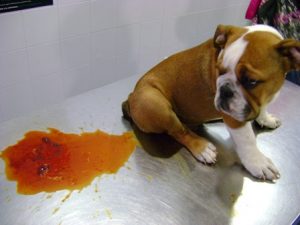 Dog having liquid bloody diarrhea from canine parvovirus infection. Photo Credit Urban Animal Veterinary
Canine Parvovirus (CPV) is a potential killer in the world of infectious organisms that can affect our dog companions. Unfortunately, many owners don't know that their pooch is infected until clinical signs of mild to severe digestive tract upset (decreased appetite, vomit, diarrhea, etc.) occur.
Dog having liquid bloody diarrhea from canine parvovirus infection. Photo Credit Urban Animal Veterinary
Canine Parvovirus (CPV) is a potential killer in the world of infectious organisms that can affect our dog companions. Unfortunately, many owners don't know that their pooch is infected until clinical signs of mild to severe digestive tract upset (decreased appetite, vomit, diarrhea, etc.) occur.CPV is diagnosis that we veterinarians hate giving our clients, as the infection holds a grave prognosis when untreated and a guarded prognosis when thoroughly treated. It's also an expensive disease to treat, as hospitalization in an isolation ward, repeated laboratory testing, IV fluid and medication administration, and other treatments are needed.
veterinarian overseeing the pet’s health.
Fortunately, CPV is a very preventable disease as a result of highly-available and reasonably-priced vaccinations, through avoidance of contact with other dogs that may be shedding the virus (or humans that have come into contact with CPV and carry it on their clothes, hands, etc.), and proper sanitary measures.
Want to learn more about Canine Parvovirus? Check out this article What is Parvovirus?
Related Articles
(linked to )
 Dr. Patrick Mahaney
Dr. Patrick Mahaney
Please leave your constructive perspective in the below Comments section and communicate with me and follow my adventures in veterinary medicine and life via Instagram (@PatrickMahaney), Twitter (@PatrickMahaney), and Facebook (Patrick Mahaney: Veterinarian Acupuncture Pain Management for Your Pets).
Copyright of this article (2018) is owned by Dr. Patrick Mahaney, Veterinarian, Certified Veterinary Acupuncturist and Certified Veterinary Journalist. Republishing any portion of this article must first be authorized by Dr. Patrick Mahaney. Requests for republishing must be approved by Dr. Patrick Mahaney and received in written format.
